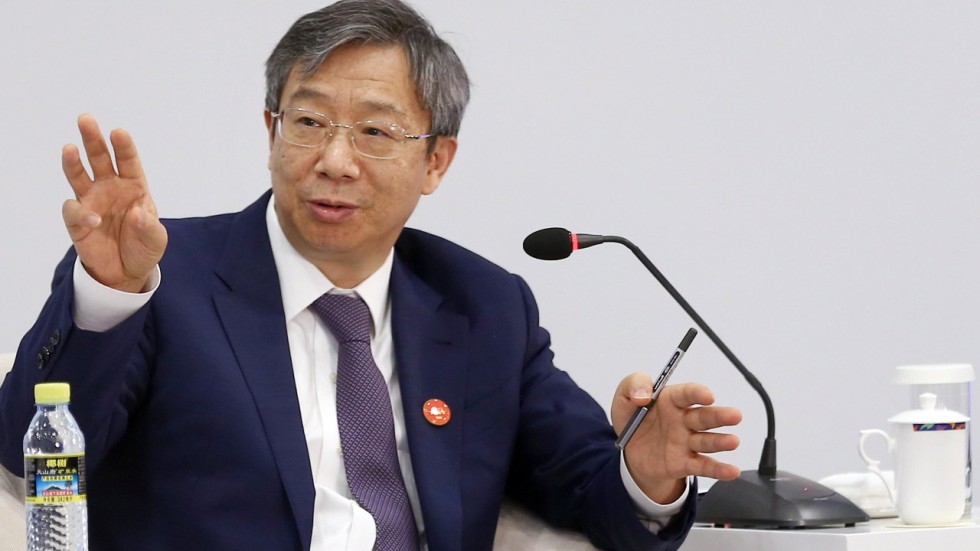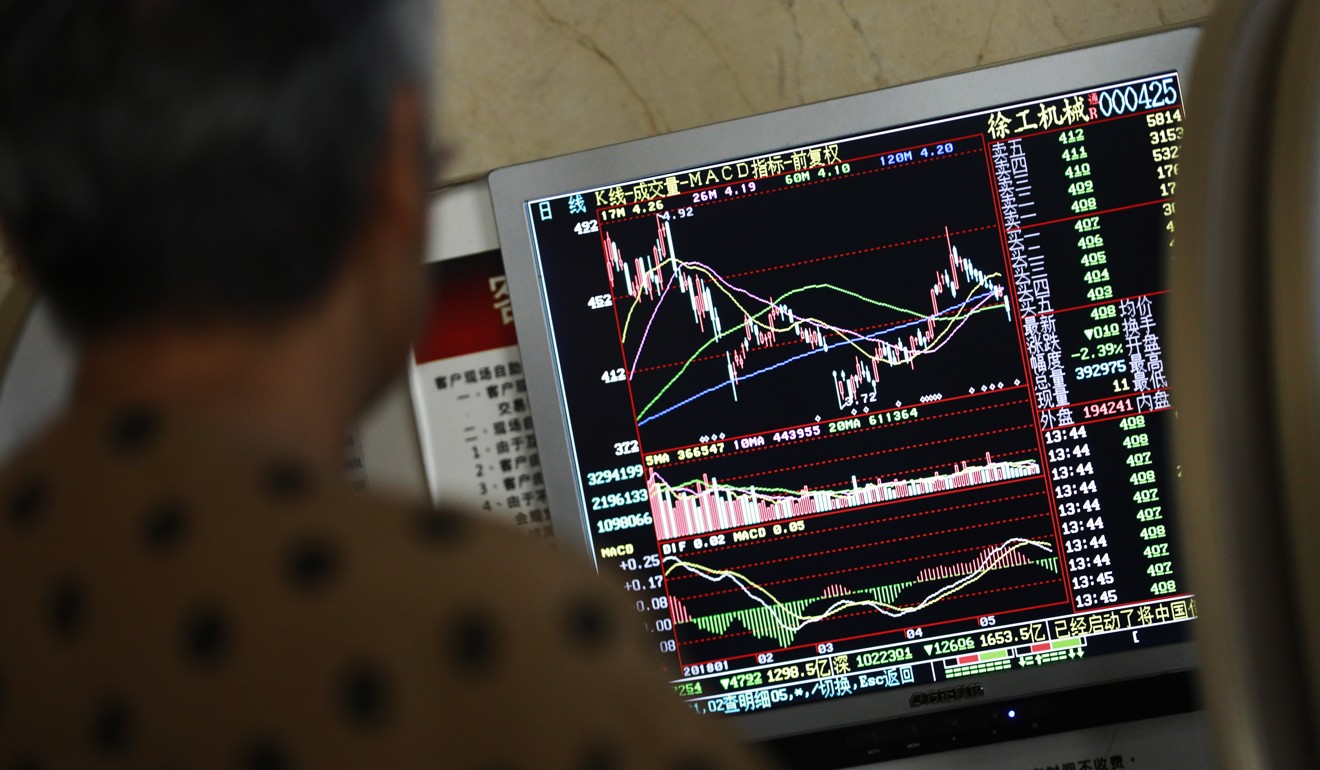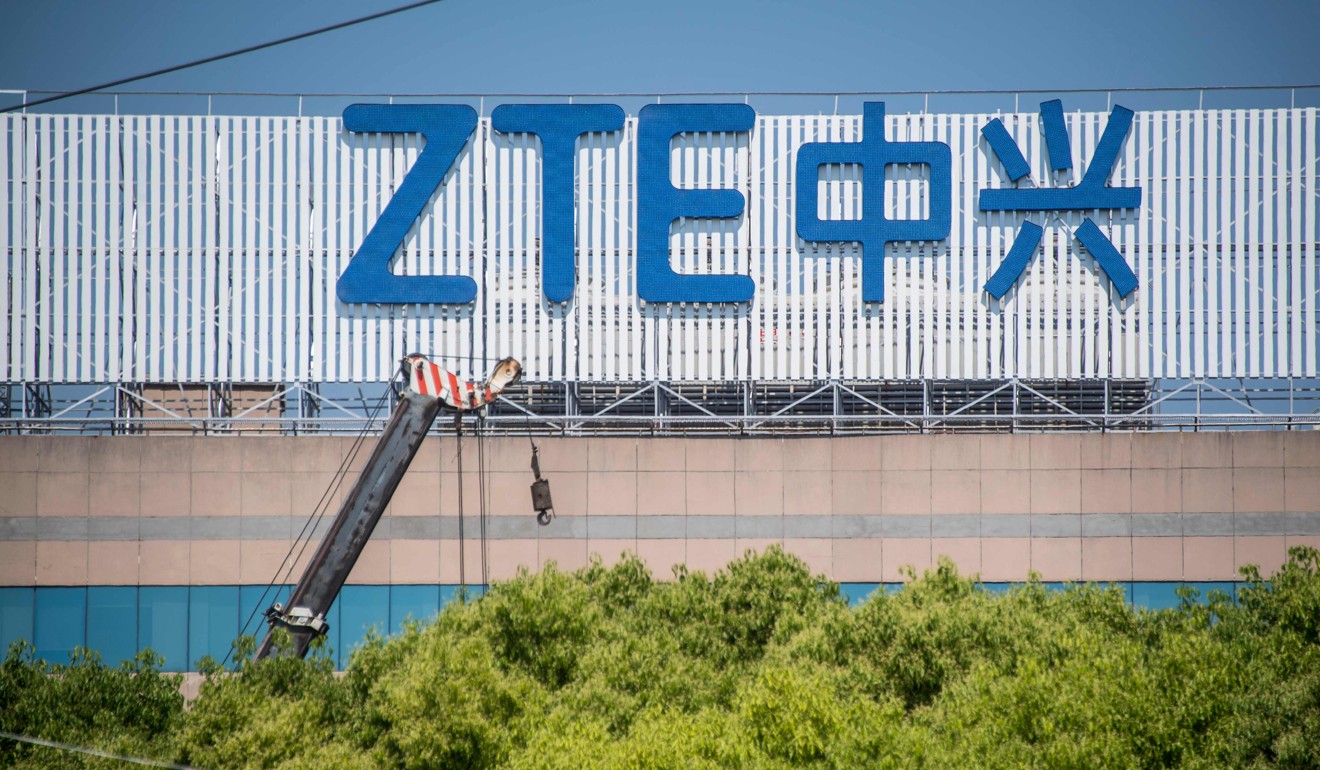China stocks take breather after four-day sell-off, as central bank governor appeals for calm
Hong Kong shares also close slightly higher after a four-day losing streak

Laura He
Chinese stocks briefly tumbled to a two-year low on Wednesday, before recouping losses in the final hour of trading and closing slightly higher, with the trading volume shrinking by nearly 30 per cent from Tuesday.
The slight rebound following a four-day sell-off came after the Chinese central bank governor appealed to the public to not lose confidence in the fundamentals that support the China growth story. Ten of China’s most influential fund managers echoed this, and tried to convince investors it was a good time to buy stocks after a big dip.
The benchmark Shanghai Composite Index fell to as low as 2,872.16 in morning trade, its worst intraday level since June 27, 2016. It reversed losses in the afternoon and closed up 0.3 per cent at 2,915.73. The index had slid by more than 5 per cent in the past five sessions.
The combined turnover for the Shanghai and Shenzhen markets dropped sharply to 348.2 billion yuan (US$53.79 billion), down 27 per cent from 473.7 billion yuan on Tuesday.
“It’s a technical rebound. It’s sort of weak, ” said Linus Yip, chief strategist at First Shanghai Securities. “Trading is inactive, and the [benchmark] index is hovering below the important 3,000 psychological level. I think the money is very cautious.”
Investors seemed unsure even after panic selling on Tuesday prompted People’s Bank of China governor Yi Gang to come forward and appeal to the country’s vast number of individual investors “not to lose confidence”.
China’s massive stock sell-off pushes benchmark index down to breach the 3,000 mark
“The market fluctuation [today] was mainly affected by emotions,” Yi Gang said in an exclusive interview with Shanghai Securities Journal, run by state-owned Xinhua News Agency, on Tuesday.
“China still has good economic fundamentals and resilient growth,” he said. “The yuan is one of few currencies that have appreciated against the US dollar this year. I’m fully confident about the health of China’s capital market based on the fundamentals.”
Still, Yi said, the PBOC will “prepare for potential external shocks” and “fend off systemic financial risks”.
Yi’s remarks were echoed by 10 of China’s most influential hedge funds and mutual funds, which issued separate statements on Wednesday, trying to convince investors it was a buying point now for A shares, which have dropped to attractive levels.
“Value buying opportunities have become more obvious, ” said Chongyang Investment Management in a statement on Wednesday on the WeChat account of Asset Management Association of China.
“The TTM [trailing twelve months] P/E ratio for the CSI300 has fallen to its lowest since the 2016 market rout.”

Meantime, China’s four state-owned financial newspapers issued front page editorials on Wednesday, urging investors to “remain calm and think rationally”. Individual investors account for 90 per cent of the total pool on the A-share market.
Analysts, however, appear to hold different views.
I’m fully confident about the health of China’s capital market based on the fundamentals
YI GANG, GOVERNOR, PBOC
“The ongoing tit-for-tat rhetoric and retaliatory tariffs point to tangible tensions in the bilateral economic relationship that are yet to be resolved, and suggest the situation could escalate further,” said Raymond Ma, a fund manager at Fidelity International.
Global stocks were hit hard on Tuesday, after US President Donald Trump threatened to impose tariffs on an additional US$200 billion of Chinese goods, followed by a response from Beijing saying China will have no choice but to take comprehensive measures against the US.
Lynda Zhou, also a portfolio manager at Fidelity, said China’s “disappointing” macro data for May has raised questions about the outlook of the economy.
“The May macroeconomic data released in the past week disappointed expectations across multiple fronts, from investment to consumption to credit growth. Overall, the escalation of trade tensions threatens to impact earnings, especially for exporters.”
Additionally, the forthcoming introduction of Chinese depositary receipts (CDRs) has affected the Chinese market sentiment.
Global stocks tumble as Trump escalates trade war with threatens of more China tariffs
“Fundraising by the biggest banks in the past two weeks for funds related to the launch of CDRs on China’s domestic markets has sucked a lot of liquidity out of the market,” said Zhou.
The telecoms sector led losses on Wednesday, with shares in ZTE falling by the daily 10 per cent limit for a fifth day in a row, after US senators voted to reinstate a ban on the Chinese telecoms company doing business with its US suppliers.
But defence shares bucked the weak market trend. Jiangxi Xinyu Guoke Technology, an explosives maker, rose by the 10 per cent limit to 42.02 yuan. Xian ChenXi Aviation Technology, which makes aircraft components, jumped by 6.5 per cent to 26.80 yuan. Xian Tian He Defence Technology, a maker of missile defence systems, gained 3 per cent to 12.20 yuan.

In Hong Kong, the Hang Seng Index also posted gains, taking a pause after a four-day sell-off that had led to the index shedding 5.3 per cent.
By close, the index had risen by 0.8 per cent to 29,696.17. The Hang Seng China Enterprises Index, which tracks the performance of Hong Kong-listed Chinese companies, inched up 0.1 per cent to 11,505.74.
The ongoing tit-for-tat rhetoric and retaliatory tariffs point to tangible tensions in the bilateral economic relationship that are yet to be resolved
RAYMOND MA, FUND MANAGER, FIDELITY INTERNATIONAL
WH Group, a Chinese meat processor that owns US pork producer Smithfield Foods, was the worst performer among blue chip stocks, falling by 1.4 per cent to HK$6.55.
ZTE’s H shares rebounded by 20 per cent to HK$11.82. Still, the stock has fallen by a combined 54 per cent since mid-April.
CK Asset Holdings gained 1 per cent to HK$64.80, after exchange information showed former chairman Li Ka-shing had spent HK$584 million in buying the company’s shares for three straight sessions since last Thursday, increasing his stake to 32.06 per cent from 31.82 per cent.
Elsewhere in the region, stocks bounced back after Tuesday’s broad market rout. Japan’s Nikkei Average was up 1.2 per cent to end at 22,555.43, Australia’s S&P/ASX 200 rose by 1.2 per cent to 6,172.60, and South Korea’s Kospi gained 1 per cent to 2,363.91.
Hong Kong may reclaim spot in top three global IPO markets in second half on a slew of expected mega tech offerings
US stocks sank on Tuesday. The blue chip gauge – the Dow Jones Industrial Average – dropped 1.2 per cent, down for a sixth straight day, marking its longest string of losses in 15 months. The index has wiped out all of its gains in 2018, and is off 0.1 per cent so far this year.
www.fotavgeia.blogspot.com
Hong Kong shares also close slightly higher after a four-day losing streak

Laura He
Chinese stocks briefly tumbled to a two-year low on Wednesday, before recouping losses in the final hour of trading and closing slightly higher, with the trading volume shrinking by nearly 30 per cent from Tuesday.
The slight rebound following a four-day sell-off came after the Chinese central bank governor appealed to the public to not lose confidence in the fundamentals that support the China growth story. Ten of China’s most influential fund managers echoed this, and tried to convince investors it was a good time to buy stocks after a big dip.
The benchmark Shanghai Composite Index fell to as low as 2,872.16 in morning trade, its worst intraday level since June 27, 2016. It reversed losses in the afternoon and closed up 0.3 per cent at 2,915.73. The index had slid by more than 5 per cent in the past five sessions.
The combined turnover for the Shanghai and Shenzhen markets dropped sharply to 348.2 billion yuan (US$53.79 billion), down 27 per cent from 473.7 billion yuan on Tuesday.
“It’s a technical rebound. It’s sort of weak, ” said Linus Yip, chief strategist at First Shanghai Securities. “Trading is inactive, and the [benchmark] index is hovering below the important 3,000 psychological level. I think the money is very cautious.”
Investors seemed unsure even after panic selling on Tuesday prompted People’s Bank of China governor Yi Gang to come forward and appeal to the country’s vast number of individual investors “not to lose confidence”.
China’s massive stock sell-off pushes benchmark index down to breach the 3,000 mark
“The market fluctuation [today] was mainly affected by emotions,” Yi Gang said in an exclusive interview with Shanghai Securities Journal, run by state-owned Xinhua News Agency, on Tuesday.
“China still has good economic fundamentals and resilient growth,” he said. “The yuan is one of few currencies that have appreciated against the US dollar this year. I’m fully confident about the health of China’s capital market based on the fundamentals.”
Still, Yi said, the PBOC will “prepare for potential external shocks” and “fend off systemic financial risks”.
Yi’s remarks were echoed by 10 of China’s most influential hedge funds and mutual funds, which issued separate statements on Wednesday, trying to convince investors it was a buying point now for A shares, which have dropped to attractive levels.
“Value buying opportunities have become more obvious, ” said Chongyang Investment Management in a statement on Wednesday on the WeChat account of Asset Management Association of China.
“The TTM [trailing twelve months] P/E ratio for the CSI300 has fallen to its lowest since the 2016 market rout.”

Meantime, China’s four state-owned financial newspapers issued front page editorials on Wednesday, urging investors to “remain calm and think rationally”. Individual investors account for 90 per cent of the total pool on the A-share market.
Analysts, however, appear to hold different views.
I’m fully confident about the health of China’s capital market based on the fundamentals
YI GANG, GOVERNOR, PBOC
“The ongoing tit-for-tat rhetoric and retaliatory tariffs point to tangible tensions in the bilateral economic relationship that are yet to be resolved, and suggest the situation could escalate further,” said Raymond Ma, a fund manager at Fidelity International.
Global stocks were hit hard on Tuesday, after US President Donald Trump threatened to impose tariffs on an additional US$200 billion of Chinese goods, followed by a response from Beijing saying China will have no choice but to take comprehensive measures against the US.
Lynda Zhou, also a portfolio manager at Fidelity, said China’s “disappointing” macro data for May has raised questions about the outlook of the economy.
“The May macroeconomic data released in the past week disappointed expectations across multiple fronts, from investment to consumption to credit growth. Overall, the escalation of trade tensions threatens to impact earnings, especially for exporters.”
Additionally, the forthcoming introduction of Chinese depositary receipts (CDRs) has affected the Chinese market sentiment.
Global stocks tumble as Trump escalates trade war with threatens of more China tariffs
“Fundraising by the biggest banks in the past two weeks for funds related to the launch of CDRs on China’s domestic markets has sucked a lot of liquidity out of the market,” said Zhou.
The telecoms sector led losses on Wednesday, with shares in ZTE falling by the daily 10 per cent limit for a fifth day in a row, after US senators voted to reinstate a ban on the Chinese telecoms company doing business with its US suppliers.
But defence shares bucked the weak market trend. Jiangxi Xinyu Guoke Technology, an explosives maker, rose by the 10 per cent limit to 42.02 yuan. Xian ChenXi Aviation Technology, which makes aircraft components, jumped by 6.5 per cent to 26.80 yuan. Xian Tian He Defence Technology, a maker of missile defence systems, gained 3 per cent to 12.20 yuan.

In Hong Kong, the Hang Seng Index also posted gains, taking a pause after a four-day sell-off that had led to the index shedding 5.3 per cent.
By close, the index had risen by 0.8 per cent to 29,696.17. The Hang Seng China Enterprises Index, which tracks the performance of Hong Kong-listed Chinese companies, inched up 0.1 per cent to 11,505.74.
The ongoing tit-for-tat rhetoric and retaliatory tariffs point to tangible tensions in the bilateral economic relationship that are yet to be resolved
RAYMOND MA, FUND MANAGER, FIDELITY INTERNATIONAL
WH Group, a Chinese meat processor that owns US pork producer Smithfield Foods, was the worst performer among blue chip stocks, falling by 1.4 per cent to HK$6.55.
ZTE’s H shares rebounded by 20 per cent to HK$11.82. Still, the stock has fallen by a combined 54 per cent since mid-April.
CK Asset Holdings gained 1 per cent to HK$64.80, after exchange information showed former chairman Li Ka-shing had spent HK$584 million in buying the company’s shares for three straight sessions since last Thursday, increasing his stake to 32.06 per cent from 31.82 per cent.
Elsewhere in the region, stocks bounced back after Tuesday’s broad market rout. Japan’s Nikkei Average was up 1.2 per cent to end at 22,555.43, Australia’s S&P/ASX 200 rose by 1.2 per cent to 6,172.60, and South Korea’s Kospi gained 1 per cent to 2,363.91.
Hong Kong may reclaim spot in top three global IPO markets in second half on a slew of expected mega tech offerings
US stocks sank on Tuesday. The blue chip gauge – the Dow Jones Industrial Average – dropped 1.2 per cent, down for a sixth straight day, marking its longest string of losses in 15 months. The index has wiped out all of its gains in 2018, and is off 0.1 per cent so far this year.
www.fotavgeia.blogspot.com

Δεν υπάρχουν σχόλια:
Δημοσίευση σχολίου